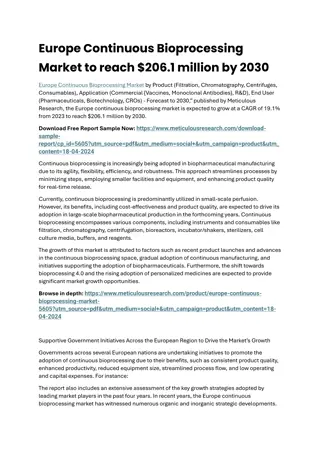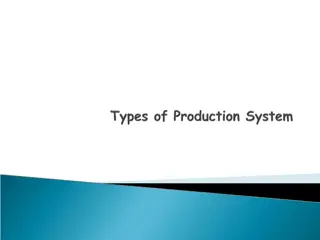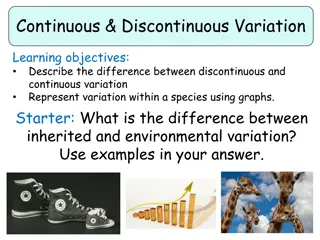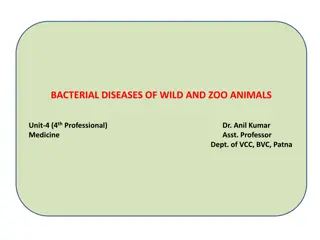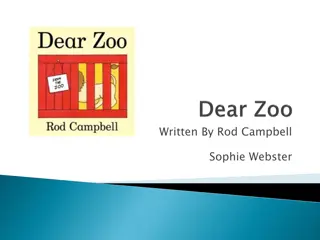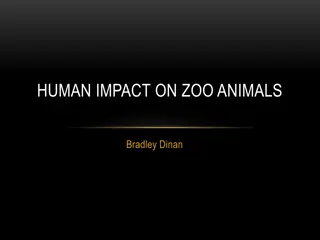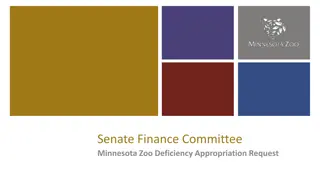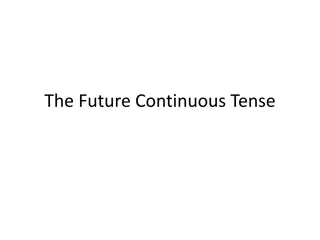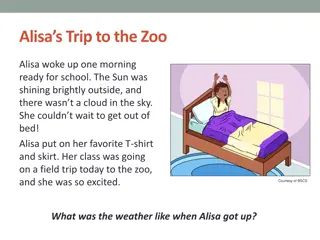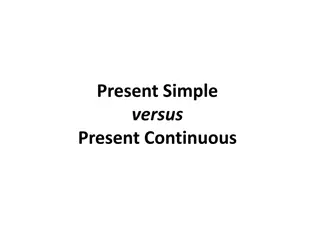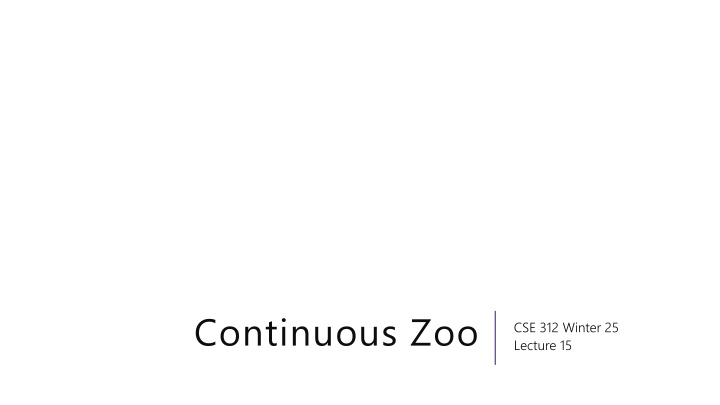
Probability Distributions and Expectations in Statistics
Explore the concepts of probability distributions, including PMF, PDF, expectation, and variance for both discrete and continuous random variables. Learn about linearity of expectation and the calculation of expectations for uniform random numbers. Dive into the comparison between discrete and continuous random variables.
Download Presentation

Please find below an Image/Link to download the presentation.
The content on the website is provided AS IS for your information and personal use only. It may not be sold, licensed, or shared on other websites without obtaining consent from the author. If you encounter any issues during the download, it is possible that the publisher has removed the file from their server.
You are allowed to download the files provided on this website for personal or commercial use, subject to the condition that they are used lawfully. All files are the property of their respective owners.
The content on the website is provided AS IS for your information and personal use only. It may not be sold, licensed, or shared on other websites without obtaining consent from the author.
E N D
Presentation Transcript
Continuous Zoo CSE 312 Winter 25 Lecture 15
Lets start with the pmf For discrete random variables, we defined the pmf: ??? = (? = ?). We can t have a pmf quite like we did for discrete random variables. Let ? be a random real number between 0 and 1. 1 ?? ? = .1 = Let s try to maintain as many rules as we can Discrete ??? 0 Continuous ??? 0 ??(?) d? = 1 Use ?? instead of ?? to remember it s different . ??(?) = 1 ?
Comparing Discrete and Continuous Discrete Random Variables Continuous Random Variables Probability ? Equivalent to impossible All impossible events have probability 0, but not conversely. PDF ??(?) gives chances relative to ??(? ) Integrate PDF to get probability Relative Chances PMF: ??? = (? = ?) Sum over PMF to get probability Events Convert from CDF to PMF Sum up PMF to get CDF. Look for breakpoints in CDF to get PMF. Integrate PDF to get CDF. Differentiate CDF to get PDF. ?[?] ?(?) ??(?) ? ??? d? ? ?[? ? ] ? ? ? ??(?) ?(?) ??? d? ? ? ?2 ? ? 2 ???(?) ? ?2 ? ? 2= 2??? d? ? ? ?
What about expectation? For a random variable ?, we define: ?(?) ??? d? ? ? = Just replace summing over the pmf with integrating the pdf. It still represents the average value of ?.
Expectation of a function For any function ? and any continuous random variable, ?: ? ? ? = ? ?(?) ??? ?? Again, analogous to the discrete case; just replace summation with integration and pmf with the pdf. We re going to treat this as a definition. Technically, this is really a theorem; since ?() is the pdf of ? and it only gives relative likelihoods for ?, we need a proof to guarantee it works for ?(?). Sometimes called Law of the Unconscious Statistician.
Linearity of Expectation Still true! ? ?? + ?? + ? = ?? ? + ??[?] + ? For all ?,?; even if they re continuous. Won t show you the proof for just ?[?? + ?], it s ? ?? + ? = ?? ? + ? ??(?) d? ?? ? ??? ?? + ? ? ??? ?? + ? = ?? ? + ? ???? ?? ??? ?? = = ?
Variance No surprises here ??? ? = ? ?? ? ? ?= ? ?? ??(?) ? ? ? ?
1 Let s calculate an expectation ? ? if ? ? ? 0 otherwise ??? = Let ? be a uniform random number between ? and ?. ? ??? d? ? ? =
1 Let s calculate an expectation ? ? if ? ? ? 0 otherwise ??? = Let ? be a uniform random number between ? and ?. ? ??? d? ? ? = ? ?? ? 0d? 1 = ? 0 d? + ? ? ? ? ? d? + 0 ? ?=?= ? ?d? + ? = 0 + ? ?2 ?2 ?2 ?2 ?2 2 ? ?= ?+? ? ? 2 ? ? =?+? = 2(? ?) 2 ? ?= 2(? ?) 2
What about ? ? ? Let ?~Unif(?,?), what about ? ?2? ?2??? d? ? ?2= ? ??2 ?2 0 d? 1 ?2 0 d? + ? ??2 = ? ?d? + ? 1 = 0 + ? ? ?d? + 0 ? ?3 3 ?3 3 ?3 1 1 1 3 ? ? ? ? ?2+ ?? + ?2 = ? ? ?=?= = ? ? 3 =?2+??+?2 3
Lets assemble the variance Var ? = ? ?2 ? ? 2 2 =?2+??+?2 ?+? 2 3(?2+2??+?2) 3 =4(?2+??+?2) 12 12 =?2 2??+?2 12 ? ?2 12 =
Continuous Uniform Distribution ?~Unif(?,?) (uniform real number between ? and ?) 1 ? ? if ? ? ? 0 otherwise 0 ? ? ? ? if ? ? ? 1 PDF: ??? = if ? < ? CDF: ??? = if ? ? ? ? =?+? 2 ? ?2 12 Var ? =
Continuous Zoo ?~?(?,??) ?~????(?,?) ?~???(?) ? ? ?? ??? ? ??? = ?? ?? for ? ? ? ? =? ??? = ? ? =? + ? ??? = ? ????? ? ? ? ? ? ?? ? ? = ? ??? ? = ?? ? ?? ?? ??? ? = ??? ? = It s a smaller zoo, but it s just as much fun!
Exponential Random Variable Like a geometric random variable, but continuous time. How long do we wait until an event happens? (instead of how many flips until a heads ) Where waiting doesn t make the event happen any sooner. Geometric: ? = ? + 1 ? 1) = (? = ?) When the first flip is tails, the coin doesn t remember it came up tails, you ve made no progress. For an exponential random variable: ? ? + 1 ? 1) = (? ?)
Are these memoryless? You arrive to a bus stop at a (uniformly) random time, to a bus that arrives every 10 minutes. How long until the bus arrives? How long conditioned on you ve already waited 8 minutes? You put everyone in class into a random order. You ll iterate through that list. What is the probability of being next? Probability of being next conditioned on not selected yet AND half the class has gone? You flip a coin (independently) until you see a heads. How many flips do you need? How many additional flips after seeing 4 tails?
Are these memoryless? You arrive to a bus stop at a (uniformly) random time, to a bus that arrives every 10 minutes. How long until the bus arrives? How long conditioned on you ve already waited 8 minutes? Not memoryless! (bus must arrive in 10 minutes total, must be soon!) You put everyone in class into a random order. You ll iterate through that list. What is the probability of being next? Probability of being next conditioned on not selected yet AND half the class has gone? Not memoryless (1/? of being first 1/(?/2) after half class gone) You flip a coin (independently) until you see a heads Memoryless!
A continuous memoryless RV? Poisson random variables come from a memoryless-type process. Number of earthquakes (people in bakery, days with snow) would be memoryless under assumption that events are independent of each other! Same experiments, but now ask a different question: Poisson: how many incidents occur in fixed interval? Exponential: how long do I have to wait to see the next incident?
Exponential random variable If you take a Poisson random variable and ask what s the time until the next event you get an exponential distribution! Let s find the CDF for an exponential. Let ?~Exp(?), be the time until the first event, when we see an average of ? events per time unit. What s (? > ?)? What Poisson are we waiting on, and what event for it tells you that ? > ??
Exponential random variable If you take a Poisson random variable and ask what s the time until the next event you get an exponential distribution! Let s find the CDF for an exponential. Let ?~Exp(?), be the time until the first event, when we see an average of ?events per time unit. What s (? > ?)? What Poisson are we waiting on? For ?~Poi(??) ? > ? = (? = 0) ??0? ?? 0! = ? ?? ? = 0 = ??? = ? ? = 1 ? ?? (for ? 0, ??? = 0 for ? < 0)
Where did the ? come from? Why did we switch from Exp(?) to Poi(??)? Let s make our units incidents/second , so ? = 3 says we average 3 incidents per second. What if I want to know the probability of waiting at least 5 seconds? Well then on average how many incidents do we see in a 5 second period? 15 incidents! So the Poisson (how many incidents in fixed interval) now refers to a larger interval, so averages more events; specifically ??.
Find the density We know the CDF, ??? = ? ? = 1 ? ?? What s the density? ??? =
Find the density We know the CDF, ??? = ? ? = 1 ? ?? What s the density? ? ??1 ? ??= 0 ? ??? ??= ?? ??. ??? = For t 0it s that expression For ? < 0it s just 0.
Exponential PDF Red: ? = 5 Blue: ? = 2 Purple: ? = 0.5
Memorylessness ? ? + 1 ? 1 = (? ?+1 ? 1) (? ?+1) 1 (1 ? ? 1) = (? 1) =? ?(?+1) ? ? = ? ?? What about (? ?) (without conditioning on the first step)? 1 (1 ? ??) = ? ?? It s the same!!! More generally, for an exponential rv ?, ? ? + ? ? ? = (? ?)
Side note I hid a trick in that algebra, ? 1 = 1 ? < 1 = 1 (? 1) The first step is the complementary law. The second step is using that 1 1??? d? = 0 In general, for continuous random variables we can switch out and < without anything changing. We can t make those switches for discrete random variables.
Expectation of an exponential Don t worry about the derivation (it s here if you re interested; you re not responsible for the derivation. Just the value. Let ?~Exp(?) ? ??? d? ? ? = ? ?? ???? Let ? = ?; ?? = ?? ???? (? = ? ??) Integrate by parts: ?? ?? ? ???? = ?? ?? 1 = 0 ?? ?? Definite Integral: ?? ?? 1 ? ?? ?? 1 ?? ??) (0 1 ?? ?? z=0 = (lim ?) ? ????) (0 1 1 ????+1 1 ?=1 By L Hopital s Rule (lim ? ??? ?) = lim ? ?
Variance of an exponential 1 ?2 If X~Exp ? then Var ? = Similar calculus tricks will get you there.
Exponential ?~Exp(?) Parameter ? 0 is the average number of events in a unit of time. ??? = ?? ?? if ? 0 0 otherwise ??? = 1 ? ?? if ? 0 0 ? ? =1 ? 1 ?2 otherwise Var ? =


